When I was younger, Sleeping Beauty was a classic favorite. Like most young girls growing up in the middle of the Disney Renascence, I loved the songs and the story and I found Maleficent to be particularly terrifying. To this day, I would still rank her among the scariest Disney villains. The wicked fairy who turned into a larger than life dragon is still quite the iconic image for Disney. The latest venture back into the world of classic stories is another in a long line of revisionist films in which the villain is transformed into a misunderstood anti-hero and the "real" story is told through the eyes of a character who was previously denied a voice in their original tale. The last example, in theaters at least, was Oz the Great and Powerful in which we learned how the Wicked Witch became wicked and of course, Once Upon a Time has been doing the villain into anti-hero into hero take for three seasons now. Most of these ideas are following in the rather large footsteps of Gregory Magurie's "Wicked" saga in which the Wicked Witch of the West is given a name and a voice and a story that cannot be reduced to "ugly witch tries to kill a good girl." Where Maguire succeeds is in his character of Elphaba--that her story is outside of normal anti-hero woman tropes; her love life factors in, but only much later. How she became "evil" is a series of events beginning with her birth. And this is what Disney--be it Oz the Great and Powerful or Maleficent--fails at. They are still stuck in 1959. The moral of this new bright and shiny Maleficent movie? Don't have sex. Sex is bad. Virginity is good.
Hashing the Plot
I want to do a quick, down and dirty plot explanation before moving into the problems I have with this film--and, to be fair, what I did like about the picture. Be aware that this is NOT spoiler-free. We are told from the first few moments that this is not the story we have been told before, but that what we are about to see is the true version of events. Long ago, there were two kingdoms, the human one and the fairy kingdom (called for some inexplicable reason The Moors). The two kingdoms were incredibly different--the human or "real" kingdom was populated by men who warred and were gluttonous and envious and revengeful. The mythic fairy kingdom--the realm of the divine--was beautiful and glorious, an inner sanctum only accessible by those who were magical and pure themselves. The king of the human land hated the fairies and wished to see them destroyed, but a tentative peace has been established at the start of the film. Inside the divine realm lived a little fairy by the name of Maleficent who was--as you might expect--good and kind and proper. She heals trees and is friends with the various mythic inhabitants that live in her realm. She's also an orphan because this is Disney and all heroes are orphans or have lost at least one parent (no, I'm not kidding. You tell me one famous Disney figure who has both parents living happily with them). When she is still quite young, a human boy wanders past the threshold of the mortal and into the divine. Heads up--in mythology, transgression into the divine never ends well.
The young boy--who is also an orphan, shockingly enough--is named Stephan and he and Maleficent become fast friends as children. Stephan visits Maleficent and the divine realm often and as they grow up together, the nature of their relationship changes. Before her 16th birthday, Stephan gives Maleficent a kiss and tells her, it is a true love's kiss. But Stephan, being a mortal boy, goes back to the mortal world to seek out his fame and fortune and gradually he begins to visit the divine realm and Maleficent less and less. But don't worry, Maleficent just gets over him. No, I'm just kidding, of course she doesn't. Because all women are weak and silly and the only thing that could possibly make them interesting is a man. But I'll come back to this later. For reasons that don't make a lot of sense, the king of the human world decides to go to war with the divine realm, which is now under the protection of Maleficent herself. The two sides engage in battle and Maleficent decimates the king's army using the Ent's from Tolkein. Well, at least that's what they look like. At the same time, she does some harmful damage to the king and the king is now at death's door. The king has no heir, only a daughter (and women are weak and foolish and cannot rule without a man), so he promises to marry of his child to the man who can kill Maleficent and bring back proof. Stephan, during all this, has become a close ally to the king, though we do not know how an orphan boy with no money or skills or talents ended up being the servant to the king. Stephan has grown ambitious in his years away from the divine and so seeks out to kill his former friend, Maleficent.
Stephan returns to the divine realm, bearing a sleeping potion. After he has lulled Maleficent into a false sense of security, he gives her the drink that will put her under and then takes out his knife, determined to end her life. But at the last second, he cannot do it, so instead, he violently removes her wings and leaves her in the woods. And yes, you are supposed to read this as sexual and yes, to be technical and CORRECT, it's a metaphorical rape and a loss of innocence. Maleficent awakens in pain and grieving for her lost wings but also her lost love who has betrayed her. This sexual awakening and trauma changes Maleficent and she determines to seek revenge on Stephan. Because Maleficent has changed, the divine realm changes. It grows dark and gloomy and the creatures grow fearful of their new dark queen, who is the Mistress of All Evil. Because she can no longer fly, Maleficent saves a raven from death and the raven swears allegiance to Maleficent, and can now turn from raven to man at Maleficent's will. After a short period of time, Stephan and the new Queen have a baby girl and there is to be a celebration in the kingdom.
From here, the film is incredibly derivative of the Disney animated classic and so this is going to go fairly quickly. At the party, Maleficent shows up and curses baby Aurora--on the babe's 16th birthday, she will prick her finger on a spinning wheel and fall into a death like sleep, never to be awoken except by True Love's Kiss, which Maleficent does not believe exists after Stephan's betrayal. Fearing for their child's safety, baby Aurora is sent to live with the three good (and incredibly annoying) fairies in a remote part of the forest until they day after her 16th birthday. The child grows up unaware of who she really is, and the whole time Maleficent stands guard over the child, watching. Because the fairies are incredibly ignorant on the ways of child-rearing, Maleficent finds herself, more often than not, taking care of Aurora and she comes to care for the child to the point where Maleficent tries to remove the curse, unsuccessfully. Maleficent and Aurora grow closer and Aurora wishes to come live with Maleficent in the Moors, which prospers once again under Aurora's hands (cause virginity is good and the divine can only be handled by the sacred feminine). But when Aurora learns her true identity, she returns to Stephan's castle. Stephan has become increasingly paranoid and has no reaction to his daughter except to lock her up. There, driven by the curse laid upon her, Aurora stumbles across a room full of spinning wheels and pricks her finger, thus subcumming to the a death-like sleep.
Prince Philip, a totally colorless character if ever there was one, tries unsuccessfully to wake the Sleeping Beauty. But there appears to be no hope for poor Princess Aurora when Philip's lips fail. Maleficent, overcome by grief that she could not stop the curse, promises the sleeping girl that she will stand guard over her and let no harm fall upon her. And then
What I Liked
--The visuals ARE stunning. There's no denying that most of the budge for this film went into making it as beautiful as possible. The land of the fairies is exactly what you think it will be, full of color and life and a sort of dream-like mythic reality that humanity can never hope to penetrate. There are some instances where I thought it was a little much, as if they threw in color and light just for the sake of it.
--Angelina Jolie was born to play this role. When this movie was announced and you heard who would play the lead, I bet most of you said, "of course." She is deliciously wicked and broken in the role. She wears the leather costumes with ease and those prosthetic cheekbones fit her to a T. You can tell that Jolie had a lot of fun with this role, really sinking her teeth into doing some good ol' fashioned scene chewing.
--The costumes are to die for. Or at least Maleficent's are. The snake skin horned head wrap is stunning and I imagine there will be an Oscar nomination for the film's costuming department. The costuming for Aurora is perfunctory; it gets the job done. The princess is rendered in soft virginal hues of pink, peach, gold, and blue.
--The curse scene was the best in the film. Straight up Disney brought to life, and I'm not going to complain. Jolie had a ton of fun filming that one, and it works for her.
What I Didn't Like
--Let's talk about sex. This movie is predicated on the fact that sex is wrong and virginity is to be celebrated. I gave this deceleration to my mother as we left the theater, to which she responded "what?!" What essentially happens to Maleficent, her driving motive for the whole film, is a loss of sexual innocence and purity. The removal of her wings as she sleeps is a stand in for both the wedding night and, as I mentioned, rape. It is this incident that turns Maleficent into the mistress of all evil; while she was still virginal and pure, even though she knew the ways of the world and the wickedness of man, she was still "good." The writer of this film decided that they only way to make Maleficent an interesting character was through sex, motherhood, and most damning of all, a man. Once she meets Stephan, her entire center becomes the love she bears for this man. We are told nothing about her life in between Stephan's visits, only that when he is gone, she mourns for him. And when he robs her of her sexual power--takes her divine feminine--she becomes a leather clad, staff wielding, baddie. The land of the divine, the fairy land, becomes dark and sinister, thorns overtaking the flowers and peaceful nature because Maleficent has lost her heart (and virginity). The woodland creatures live in fear of what Maleficent has become, a sexually aware woman who's entire modus operandi is focused on a man. Now, I am not trying to diminish rape even in the slightest, but this movie is one giant fail of the Bechdel test because everything revolves around a man: be it the dying and vengeful king; young boy Stephan; teenage heartthrob Stephan; horrible father Stephan; and crazed Stephan who must die. You almost expect Maleficent to pull out a pint of Ben and Jerry's ice cream and her Adele "21" CD and sing "Someone Like You." It is only when Maleficent if gifted her sexual power back--in the form of her divine angelic wings--does she manage to conquer the man who stole it from her in the first place.
The only time a man is not in control? Virginal Aurora. Philip is reduced to a side character who has maybe 10 lines, which is ironic given that the Disney animated film is really his story, not Sleeping Beauty's. Aurora is the perpetual virgin queen that was promised, if not on film than in the mythic reality in which this film operates and from the archetypal world from which it draws. True love's kiss from a man does not work on Aurora, her father has little emotional effect on her, and in the end we aren't sure what the status of Philip and Aurora even are. When Aurora enters the fairy land, it springs to life in the wake of her purity and innocence. The final shot of the film is Aurora, bathed in gold (the same color, mind of you, of the divine light that radiates from Maleficent's wings once they are returned to her) being crowned queen of both the mortal and the divine realm. Philip is there but only in the last few seconds, and the movie leave it vague what their relationship is. Are they to be friends as once Maleficent and Stephan were, thereby breaking the violent cycle? Are they to be lovers? Partners? We are not sure. Disney canon will, of course, say that they are lovers and will be wed, but Disney canon also said that Philip's true love kiss would wake Aurora from her curse. Aurora is not made the queen of the realms because she is a good ruler or even because she has a strict "right" to them (the mortal one perhaps though that is complicated since the sexist overtones of the movie make it impossible to believe that the kingdom would let a woman rule, but not the divine. Maleficent was the ruler because she was the "best" of them all). Aurora rules because she is the essence of purity and sexual innocence. Her interactions with Philip, when they meet, are timid and shy; she can barely speak to him.She is the perfect example of being demurely feminine.
It's a bit un-post modern and it's not really revisionist: the only way for a woman to be powerful is to be either a virgin (Aurora) or a mother (Maleficent), though the virgin clearly trumps all. In a way, Maleficent becomes the Sleeping Beauty who who has something taken from her and only returned through true love. There are a few images that reinforce what I've been saying that I'll just touch on them quickly: the potion Stephan gives Maleficent is blood red and we only see it steadily dripping on to the ground like the blood that would have occurred during the breaking of the hymen; the metaphor is taken further by the wings being on display, like a bloody sheet that would have been hung up to prove that a marriage was consummated. There is a lot of phallic imagery, from the way Stephan constantly weilds his knife, to the many swords used to take down Maleficent to the staff Maleficent uses after the assault as a crutch (metaphor alert: Maleficent uses the representation of the male sex organ because her own sexual power has been taken!). I suspect some will claim that Maleficent gets her sexual power back (her wings) and thus defeats Stephan but I find his problematic for two reasons. First, Maleficent does not retrieve her wings, they are given back to her by Aurora. And second, even with her recovered wings, Maleficent can not be the queen of the divine realm; that position now belongs to virginal Aurora.
--Aurora. Oh boy, where to start? Well, for one, they kept her very Disney-fied. She's a simpering moron with little to say or do. Elle Fanning's job in this movie to be pretty. She is to stand quietly and smile and look pretty. Like in Disney, she is granted gifts from the fairies: beauty and grace. Because that is all a woman is supposed to offer this world, I suppose. A true revision would have given her some smarts so she didn't do idiotic things like think the leather clad woman with horns was her fairy godmother (not kidding). I suppose since all that was required was to be pretty, she did it well. You can add Philip to this list as well as an essentially useless character who's role was to simply be there because nostalgia dictates it.
--The three fairies, who were the best part of the Disney move, are incredibly annoying and shrill. They are the comic relief of the film and spend more time shrieking and fighting with each other than they do anything else. In the Disney film, they are actually quite helpful and powerful. Another case of turning women into simpering idiots, I suppose.
--A lot of quiet moments of no action or advancement. Now, I complimented Jolie in this role and I meant it. But too much of this film is the director having Maleficent sitting or standing and simply looking. She spends a lot of time watching and gazing and the director takes advantage of Jolie's looks and makeup and costuming to find ways to light her and angle his camera to capture her beauty. It was fine the first few times because she does look incredible, but after awhile, I began to get annoyed with the constant close ups and focus on her cheekbones and eyes.
--Maleficent doesn't turn into a dragon. I am going to repeat that. Maleficent doesn't turn into a dragon. Good lord--even ONCE got that part right!
Over all grade and thoughts: I'm going to give it a C. The film is visually stunning and Jolie is divine looking in the costuming. But the not so revisionist "revision" and really sexist plot line take away a lot of the enjoyment I expected from this film. There is little in the way of laughter, though the film tries with the three fairies and occasionally the raven, who was a good character if very underused. It's a very short film, for a summer flick, so it may be worth the money to go see it, but I'd wait until your local theater offers cheaper tickets.
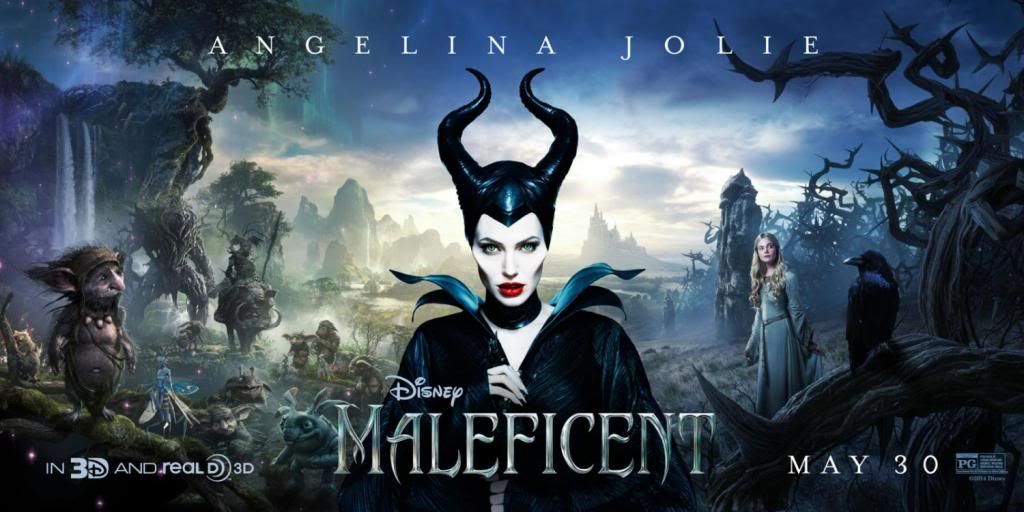

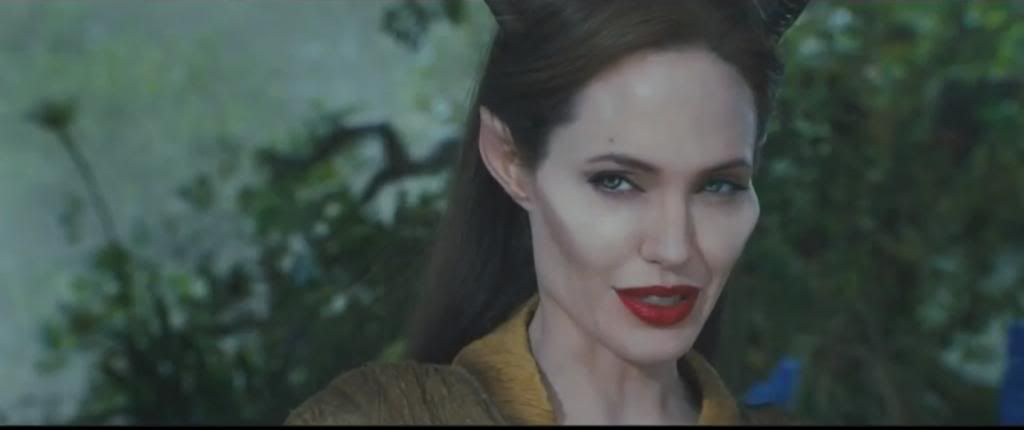
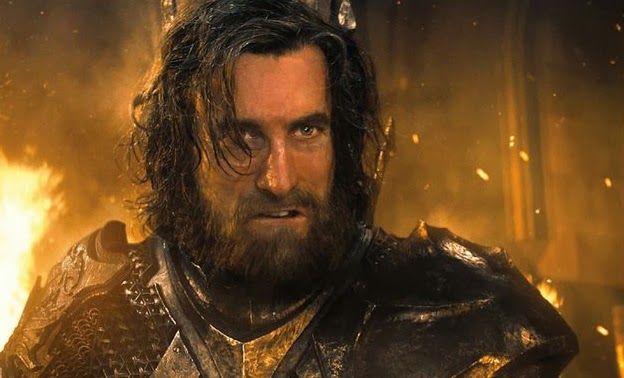





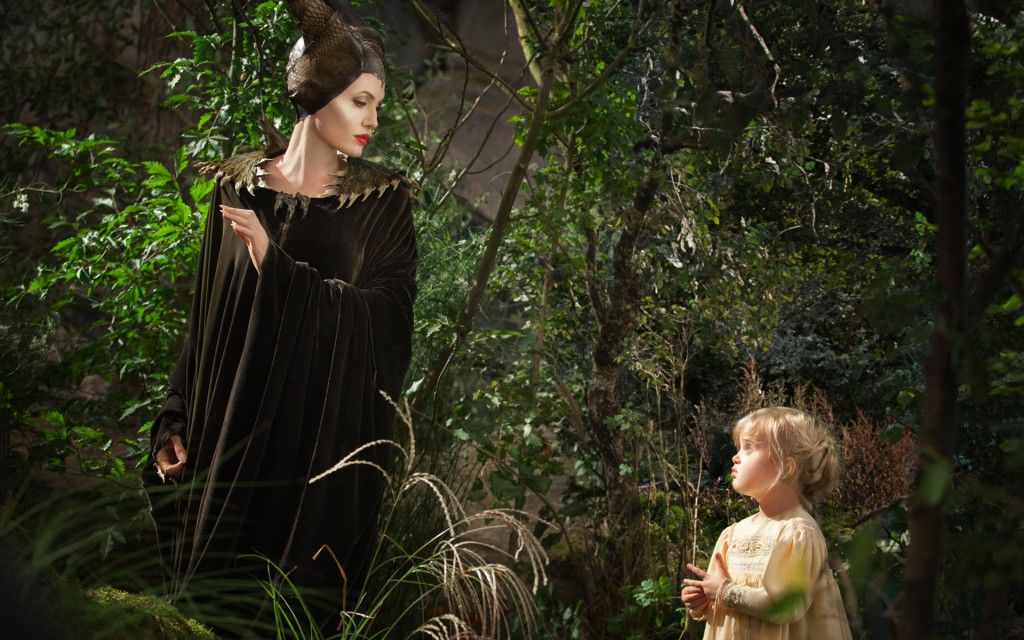

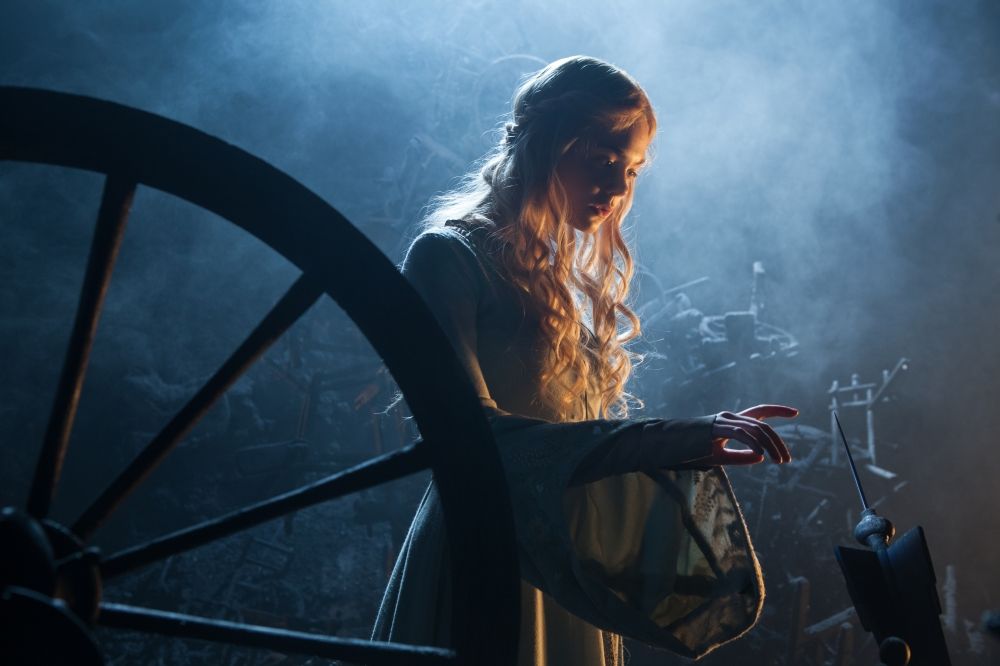

This comment has been removed by a blog administrator.
ReplyDelete